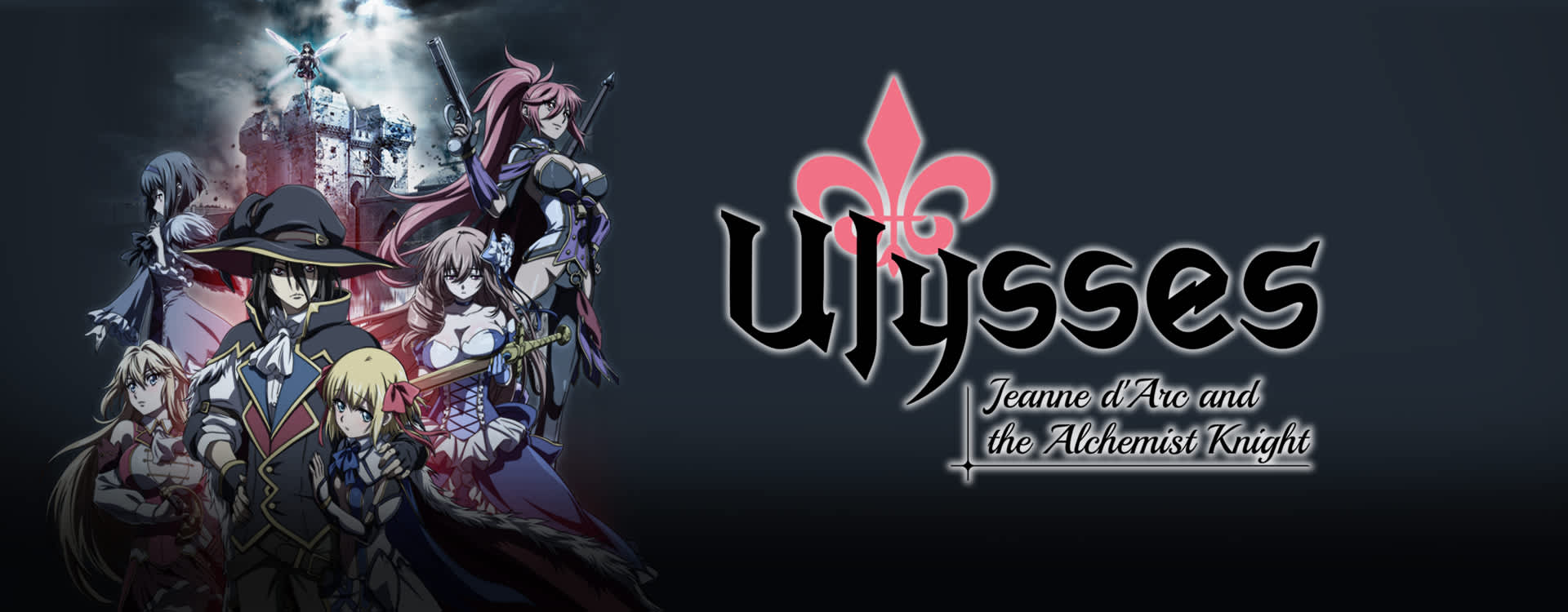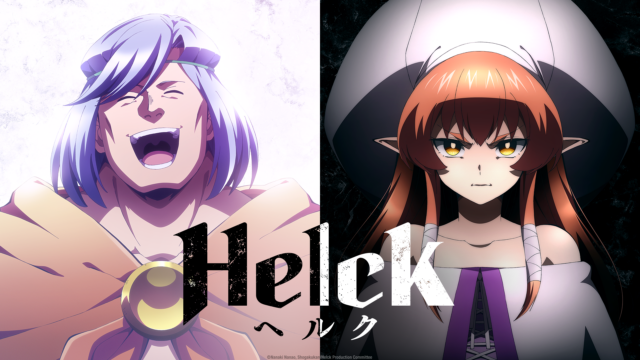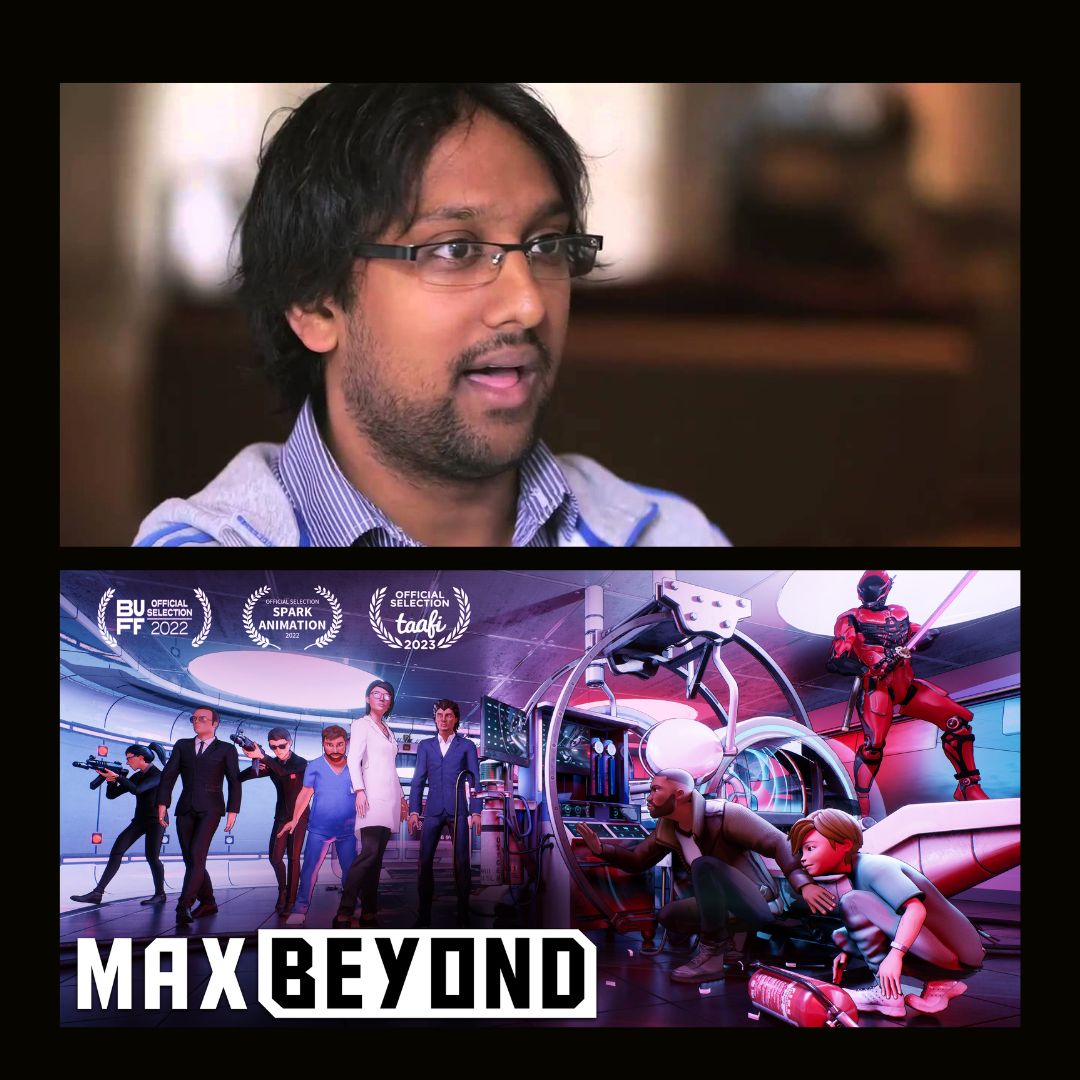English Dub Season Review: Ulysses-Jeanne d’Arc and the Alchemist Knight Season One
You’re better off reading the unrelated 730 page novel by James Joyce.
They say that history is written by the winners. What that usually means is that, in any given conflict across our species’ existence, the winner of that conflict gets to rewrite the narrative about the events that took place to their benefit. This is still true to some regard in the modern day, but the farther away we get from certain historical moments, the more room we have to fill in by ourselves with revisionist interpretations in fiction like the films based on Mulan or Anastasia, which take these moments in time and sand off some of the rougher edges for a younger audience. Sometimes those attempts bring about impactful and fondly remembered stories like the two I’ve mentioned. Other times, you get something like Ulysses-Jeanne d’Arc and the Alchemist Knight, a disturbing slog through a thoroughly raunchy, disturbing, and warped take on the key players in the story of who we know as Joan of Arc.
THE PLOT:
Ulysses’ story, despite the subtitle giving Jeanne top billing, is decidedly about a young hopeful French alchemist named Montmorency who grows up in the midst of the Hundred Years War, through which his once peaceful youth is shattered as his school friends from many nations are sent back to their own separate sides of the conflict. Montmorency hopes to reunite his friends by using his growing alchemic knowledge to stop war with the legendary Philosopher’s Stone, as well as the aid of its self-proclaimed guardian, an ancient fairy named Astaroth. But he is soon forced to use a portion of the stone on a young girl (12 years old) mortally wounded by bandits, Jeanne d’Arc. However, the stone’s power seems to give her supernatural abilities under the title of “Ulysses” that could inspire the nation to unite and fight back to end the war…and also he has to kiss Jeanne a bunch to make her power work. I know, I’ll get back to that.
The plot itself seems pretty straightforward at first, with the initial few episodes having Montmorency, Astaroth, and Jeanne travelling to meet the rightful heir to the French throne, Montmorency’s old friend Charlotte, in order to help ignite support for facing the English. Once there, they find one of his other friends, Richemont, is held as a prisoner, and the remaining one, Philippe, is en route for peace negotiations, meaning we can meet all of the principal characters at once. Things seem bound for a pleasant reunion, but things are undone as Philippe is still bound by literal ghosts of her past, and Richemont flees soon after due to bad blood between her and Charlotte, with the growing chaos being capped off by Jeanne seemingly being killed by a dark Ulysses who is actually Philippe in disguise!
However, soon after, there seems to be a bit of a sudden shift in the story’s trajectory. I’ve seen this happen a few times in 12-13 episode shows based on ongoing source material that has make up a new ending fast where there wasn’t one before because they’re probably not going to get another season to tell the rest. Certain character arcs need to be aborted (if they haven’t been cut entirely), recurring enemies need to be rapidly dealt with, and a new enemy must appear and have a usually dubious connection to the first episode. We definitely start seeing that around the eighth episode, where a new enemy is introduced who is seemingly supposed to be a bigger threat than they appear before being soundly defeated by another character reappearing from a sudden off-screen character arc completion and then they’re all absent until the final episode in a cameo.
And then there’s the screeching left turn into the last three episodes, where, after spending several episodes building up a plot to conquer the town of Orleans to bring Charlotte to a proper area to be crowned queen, that plot is suddenly discarded in favor of fighting a Sumerian god who was sealed away and owns a satellite cannon so he can fill the earth with demons and maybe blow it up. You can see how it looks like things got away from the writers. MAYBE this is how the plot goes in the light novels, but I really doubt it. It really feels like sticking with the historical-fantasy plot and focusing on getting Charlotte to being crowned would be the optimal climax, but it ends up being an afterthought that’s explained very briefly in the final seconds of the series. And also that Jeanne won’t have her historical death of being burned alive because…friendship?
Although, even the seemingly well structured aspects of the first half are a tough watch on their own, which leads me to my next point.
THE FANSERVICE AND THE HISTORY:
Anime, manga, and light novels have this reputation of being way more willing to stretch cultural taboos in their stories than would normally be acceptable in the west and that is no less true in recent years. Most longtime fans have become rather numb to this, but there does seem to be some more attempts lately to understand, discuss, and cut down on this for the sake of selling these stories and shows to a global market, which would make Ulysses practically a guidebook on how NOT to do this, because GOOD LORD IN HEAVEN does it cross lines I never hoped to see in my anime.
Historical accuracy is almost expected to be thrown out the window in these sorts of stories, so there’s no love lost with the show starting off by gender-bending most of Montmorency’s friends and allies, who were all old men in historical records, into buxom ladies with insanely revealing outfits who would all like to drink his elixir if you catch my meaning. Kinda weird, but par for the course at this point. THEN we get to Jeanne, who has been turned into a child of twelve years and MAIN LOVE INTEREST to Montmorency, whose powers can only be recharged by tongue-kissing him to gain magic spit to calm the stone down, and THEN she gets probably the outfit with the least amount of cloth or armor out of anyone in the show. Green Lantern just has to chant an oath to recharge his batteries for weeks but this little girl must french kiss a grown adult every day. Someone actually wrote that into a story and got paid for it.
But what makes this aspect even more maddening is not just the obvious age difference and all the creepy shit that entails, but who exactly is kissing who here. Just like I cannot stress enough that Jeanne is twelve, I also really can’t leave alone the fact that Montmorency is based on Gilles de Rais, an actual legendary pedophile, kidnapper, rapist, and murderer who is primarily known for that and little else. THIS guy was who author Mikage Kasuga thought would be his protagonist who slowly falls for the twelve year old he has to kiss with no awareness of what his historical inspiration is most commonly associated with, even with the show glimpsing into the future to remind us of Jeanne’s eventual death. And to that choice I must ask:
WHYYYYYYYYYY????????????????
What was the point this story was trying to make by having Montmorency, known historically as doing horrible things to children, the unambiguous hero with a heart of gold while making Jeanne a child? It would be one thing if part of his arc was a gradual spiral into insanity and depravity to possibly say something about…I don’t know, how power and fame corrupt even the good-hearted? That’s the best I can come up with. But the story never even nudges in addressing or even implying this is where things would end up, only that he is supposed to usher in the apocalypse due to some ancient prophecy and even THAT is undone with no consequences. Which leads me to a rather unfortunate conclusion.
I don’t know Mikage Kasuga, so I don’t know what’s going on in their head as they write these things, but either they did some VERY cursory research on this subject before writing…or this might be some sort of misguided attempt at “redeeming” the perception of Gilles de Rais into a hero while also defending romantic love between adults and children. Which I can’t believe anyone thought was a good idea in an era where all I needed to find out about this connection was click on the show’s Wikipedia article. I guess this will just be one of the baffling mysteries of this show I will never have answered.
CHARACTERS:
Montmorency:
I got all that stuff about the real life Montmorency out of the way so I can talk about him on his own, because the two are so different they might as well be separate people. Montmorency as he is written here is pretty much your standard make and model of a male anime protagonist. Has a swath of potential love interests from childhood, only wants to help people, has a tragic past with dead parents and relative who wants to bang him (yes that is all too common in these shows), etc, etc. He begins the show wanting to keep all his friends together, which leads him to study the Philosopher’s Stone for about seven years, after which he finds life around him as changed and all his friends have gone their separate ways. So, his goal becomes about reuniting them and, when that doesn’t work, using his knowledge and resources along with Jeanne’s powers to help defend the French army.
His relationship with Jeanne is a primary source for his development, which is still creepy as fuck regardless of context, but it’s AN arc so I might as well talk about it. He meets her as a regular human girl who he then saves from dying by using part of the stone he originally intended for another friend, and because of an alchemical accident she caused, he gains the ability to produce an elixir from his spit that is necessary to using the stone’s powers, which Jeanne needs to settle down the power inside of her every time she uses it (which is a pretty long way to go when you could just say “I’m a registered sex offender”). But despite warnings that using the stone would make him go insane and become the “Beast of the Apocalypse”, it actually had nothing to do with him using it and more because the stone resurrects ancient Sumerian gods to possess him. So his good nature is protected, aside from all the awful stuff he does with Jeanne.
He initially sees Jeanne as nothing more than a child but slowly gains affection for her the more their need to kiss becomes frequent until he’s distraught over her apparent death and realizes his feelings soon after. Then, to show his devotion to her, he swallows the other part of the stone to also gain abilities. His last bit of growth occurs when he sees a vision of Jeanne’s eventual death, which causes him to spiral into depression while being possessed by the final boss, but Jeanne snaps him out of it by simply the telling him that future just…won’t happen. And so it doesn’t.
But ultimately, Montmorency is incredibly kind to the innocent and his friends, simply wanting to end conflict instead of seek vengeance against those who wrong him. While he’ll marry his cousin for troops and money while swearing an oath to a twelve year old, he’s not really portrayed as a necessarily BAD guy…it’s just that he’s BASED on a legendarily bad guy from history and also the writer’s twisted values make him do bad things while not understanding that they’re bad.
Astaroth:
Now we can get into the more potentially interesting characters, starting with the imp of a sidekick who is the court-appointed guardian for the Philosopher’s Stone. She’s initially apprehensive working with Montmorency or humans in general and we soon understand why, as she’s been alive for most of humanity’s existence and seen them make the same mistakes over and over, even with previous holders of the stone’s powers. It’s also implied she might be the goddess Venus, as she shows Montmorency an illusion of Venus in order to get lure him away from his growing attraction to Jeanne, then later says that Venus is “always beside” him. She also has knowledge of other Philosopher’s Stones around the world, including other magical items that she hid herself thousands of years ago which come in handy down the road.
In the final episodes, we learn of her working with a member of the Knight’s Templar (don’t ask) who helps her banish one of the creators of humanity who becomes the last enemy of the show, so she puts her immortal life on the line to protect the current generation in that person’s honor. After the fight, she considers her work done and tries to leave, but is stopped by Montmorency, who promises to show her a brighter future. Basically, I’ve seen this type of character done far better before, but also a lot worse.
Richemont & Charlotte:
It might be weird that I’m pairing these two up, considering they barely interact across the majority of the series, but I have my reasons. For one, they are part of the main group of four friends along with Montmorency and Philippe that vow to stay friends throughout the war. But Richemont in particular starts the story as what you’d assume would be the most important character among the three girls of the group, having a special friendship with Montmorency and even being the one he wished to save with the stone, her disappearance in battle being the impetus for his seven years of solitude.
When we next meet her after the seven year time jump, her feelings for him have changed and become more complicated due to his seeming abandonment of her, but she puts them aside to fight along him, Jeanne, and Charlotte. Then she gets in an argument with Charlotte over their families and sees Montmorency swear an oath to Jeanne, which, coupled with her frustration over getting her older brother to lend them his troops, leads her to flee the war in tears.
She then pops up again to save her YOUNGER brother from English troops along with her own troops, having apparently dealt with all of her conflicted feelings off-screen and ready to rejoin the fight. This is part of what I mean regarding the plots and character arcs seemingly being halted to shift to the newly written ending, since it seemed more like her jealousy and betrayal would lead her to join the enemy, who she worked with previously (which would still be cheesy and dumb, but even that would be more interesting than “and then she just got over it”).
And this is where Charlotte comes in, as rebuilding their friendship after that argument seemed like a more important thread than it ended up being. Charlotte’s seven missing years are about as tragic as the rest of her friends, where she had to succeed the throne of France after all her male relatives died, but experiencing so much loss has made her easy to manipulate, including in locking up Richemont for minor crimes. It’s only through Montmorency’s help that she’s able to overcome this and renew her faith in her people, as well as gain a soft spot for Jeanne after she saves Charlotte from a couple assassins. Then the argument with Richemont happens and the group must fight without her, and then Charlotte is basically in the background for just about the rest of the show, even with the main thrust of the plot is to get her crowned.
It’s also revealed that the French royals also have their own Philosopher’s Stone, an ancient sword called Joyeuse that eventually goes to a mercenary named La Hire. However, this is where I think a potentially satisfying payoff between Charlotte could have come in, as Richemont could have turned traitor and been motivated to kill Charlotte, only to be talked down and given Joyeuse, becoming a Ulysses herself, regaining Charlotte’s friendship, and fulfilling Montmorency’s wish to see her gain a stone. At least, that’s what I might have done if I had written this, but then again I’d probably not want my name on it anyway. Point is, both of these characters are pretty much sidelined despite their initial importance, which is just another sign of wastefulness and odd choices in this story.
Philippe:
Philippe is, as I’ve said, another of Montmorency’s friends from childhood who also has feelings for him. Yet like Charlotte, her seven years also saw a major loss in her life, specifically her father at the hands of some French radicals, driving a wedge between their friendship. She arrives around the time of Montmorency showing up to negotiate a surrender and almost considers his offer to help them fight the English, but her father returns in spirit form, commanding her to fight for her family’s honor. She kisses Montmorency as she leaves, seemingly as a goodbye, but also to gain some of his elixir to use for her family’s own Philosopher’s Stone, the Holy Grail (which is a helmet because shut up).
The Holy Grail gives her the same strength as Jeanne, but also regenerative abilities and the power to look like an actual adult woman (which Jeanne does not have because, again, shut up). But because of her being chained to her family’s plans for vengeance and having to fight her friends and the man she loves, she sees this mission as an attempt for redemption by suicide. While she was known as an especially kind princess, the power gives her a great bloodlust that tears through swathes of soldiers, but her real plan is die as she pins Jeanne down for her partner Glasdale to shoot with HIS OWN Philospher’s Stone (jesus how many of these things are there). This does not work, but she then decides to try this at least a couple more times before Glasdale just takes pity on her and shoots the helmet off instead.
Despite her new wicked nature, goodness still remains within Philippe, as shown when she fights with Jeanne in the final battle to save Montmorency before losing the Grail. But as she returns home, she finds it has been reconstructed, with her father hoping to use her again. In her last moments in the show, she rejects her fathers’ plan and heads out on her own, with Montmorency tragically never knowing her fight this whole time. That said, I think things would have felt more conclusive if the helmet had just been destroyed and not mysteriously repaired, but that’s hardly the worst thing about this whole arrangement.
Jeanne:
And lastly, we get to the Muppet Babies version of Jeanne d’Arc. We first meet Jeanne as a lonely orphan who lives with fairies and is eager to bring the war to an end with prayers, the only way she knows how to help. She’s also kind of obsessed with chest sizes but I’d put that blame on the writer’s demented mind before anything else, and it really doesn’t contribute anything to the story other than crude attempts at raunchy humor. She falls for Montmorency pretty quickly, especially after he saves her life by giving her half of the stone, and remains fiercely loyal to him throughout the rest of the series, aside from one moment of doubt when she learns of his marriage of convenience to his cousin, but even that is something she gets over pretty quickly afterwards.
As the first Ulysses seen in the show, Jeanne’s adjustment to her abilities is also a journey she goes through. It’s also one of the creepy and disgusting parts of the show, so I’ll just summarize. Initially, she’s only able to make use of the stone’s power to accelerate for three minutes a day and must be recharged by…drinking Montmorency’s elixir. She proves to be a person who cares about protecting others, likely due to her losing her sister at a young age, and helps fight off an assassin which earns her the favor of Charlotte and a crucial place amongst the French army to act as a saint. Things just sort of carry on from there until she’s first “killed” by Ulysses Noire and has to deal with being dead until she’s healed and revived, after which she rushes back into battle.
Then the final fight happens and she somehow gains the ability to use her powers twice in a day, all in the hopes of saving Montmorency from his possession. Apparently due to their connection through the two halves of the Stone, she’s able to enter his mind and get him to snap out of his depression over her future death. Basically, on paper (aside from the kissing and pedophilia), she’s one of many characters here who sound like they would perfectly fine had they been in a different show. Unfortunately, they’re in this one.
Everyone else:
Yes, other characters exist in this show, but they’re basically just symptoms of its greater problems. La Hire is mostly pure fan-service and has a soft spot for cute things, but that doesn’t really add up to a character, even when she becomes a Ulysses herself and becomes part of the final battle. Her second-in-command is even less developed, essentially having every other line be about how he wants to bang her. Alencon, Richemont’s younger brother (who I got mixed up with her older one due to them never appearing in the same room and me not caring, so sorry about that) has a brief arc about overcoming his sister’s shadow that is abruptly wrapped up just like his sister’s.
Batard is also pretty gimmicky and indicative of the increasingly troubling cliché of a male character who dresses up like a cute girl only to remind us at every step that they are a man, and if they delved into that in any way beyond being part of a fetish joke, it would mean something. The only really notable villain aside from Phillipe would be Glasdale, who gets a brief, unprompted, delve into his backstory where he apparently accidentally killed his wife(?) at behest of his former lord. And I can’t leave out Enlil for being a Giant Space Flea From Nowhere because that’s him in a nutshell.
THE ENDING…SONG:
One thing I swore to myself I would mention in this summary was the ending credits, which are similar versions of the same song. Funimation doesn’t subtitle the opening or ending songs anymore (apparently something to do with licensing), but even with my cursory knowledge of Japanese, I could tell that the lyrics of each of the ten versions (leaving out the first and last episode) have distinctly different from each other. Each version is also accompanied with stunning art pieces that almost made the increasingly distressing nature of the show more bearable. However, none of them seem to have much, if any, direct link to the events of the story until maybe the last three.
Part of me wonders if this was to build up the eventual emergence of Enlil as this ancient evil who was lurking just beneath the surface, which is move in fiction I actually like to see done like in shows like Gravity Falls with Bill Cipher or what I hear the movie Hereditary is like. But no, turns out it was just a bunch of cool art to go with a relaxing song, which I might look up and try to mentally disassociate with this series.
CONCLUSION:
Okay, at 4000+ words, I think I’ve gotten my point across here. Unlike Conception, which was just an exhausting boring slog from beginning to end, “Ulysses: Jeanne d’Arc and the Alchemist Knight” is the kind of bad show that I find myself constantly finding new things to ponder despite the fact that I will likely never truly understand or comprehend. It’s basically a Lovecraftian tome in the form of an anime, slowly driving me to madness that I can’t escape from. Hopefully my insanity can be passed onto you fine readers at home so my nights may once again know sleep. Thankfully, this series has been critically panned across pretty much the entire anime watching community, so I can’t see it getting anything in terms of a continuation, and the inspirations of these characters will live on in other media through far more interesting and accurate versions. They say history is written by the winners, and the winners will be those who don’t watch Ulysses.
























Hi Ashley, thank you so much for reading and we love the feedback. Note that on that day we had 14th posts go up and only ten posts show on the front page, so it's possible the preview had already been archived by the time you got to it. One recommendation would be to add our RSS feed to your favorite news aggregator service like Feedly, this way you get all of the latest posts!